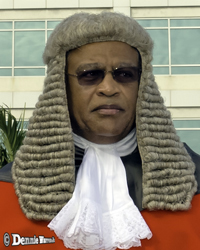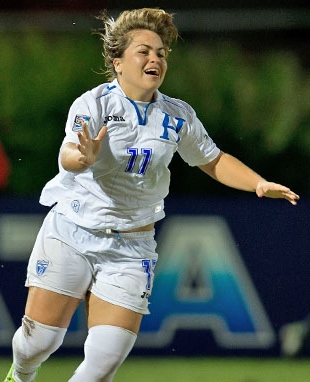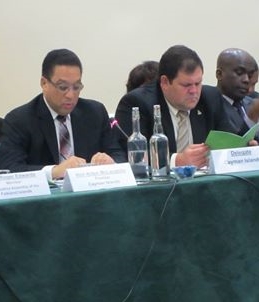Archive for January 15th, 2014

Suspect charged over East End knife attack
(CNS): A 32-year-old man has now been charged in connection with an attack on a 47-year-old man in his East End home at the weekend. Although the man was arrested Monday, the day after the attack, on suspicion of attempted murder the charges brought today were wounding with intent and carrying an offensive weapon. According to the original report from the police, the man had allegedly gone into the victim’s home in the early hours of Sunday 12 January and stabbed him in the back multiple times.

Cops charge man over high speed chase
(CNS): The man who is suspected of instigated a high speed car chase in George Town and failing to appear in court on burglary charges has been remanded in custody after appearing in court Tuesday. He was arrested following a pursuit through the streets of George Town in which seven cars were damaged including three police cars. Officers had taken off after the man when he was spotted by an officer who knew he was wanted on a warrant after failing to appear in court. The 33 year old West Bay man has now been charged with seven counts of damage to property, four counts of burglary, as well as possession and consumption of ganja and cocaine.

CJ pleads for new court
 (CNS): The chief justice, once again, made it abundantly clear at the opening of the Grand Court Wednesday that Cayman needs a new courthouse. He said the jurisdiction was falling short of international standards and at risk of falling foul of its own constitution with increasing delays in justice. CJ Anthony Smellie noted that it is taking over a year for criminal cases to reach trial, double the international benchmark, as he revealed that 94 Grand Court cases from 2013 were being carried over to 2014. The chief justice acknowledged other issues, such as the management of cases by the police and the director of public prosecutions, as well as the shortage of defence attorneys, as contributing to the delays, but the main barrier to speedier justice, he stated emphatically, was the lack of space.
(CNS): The chief justice, once again, made it abundantly clear at the opening of the Grand Court Wednesday that Cayman needs a new courthouse. He said the jurisdiction was falling short of international standards and at risk of falling foul of its own constitution with increasing delays in justice. CJ Anthony Smellie noted that it is taking over a year for criminal cases to reach trial, double the international benchmark, as he revealed that 94 Grand Court cases from 2013 were being carried over to 2014. The chief justice acknowledged other issues, such as the management of cases by the police and the director of public prosecutions, as well as the shortage of defence attorneys, as contributing to the delays, but the main barrier to speedier justice, he stated emphatically, was the lack of space.
He said nothing highlights the current situation in the courts more than the massive number of cases in the Summary Court as well as the Grand Court that were being pushed over to the new year.
The CJ said that for more than a decade the local judiciary has been in need of a new courthouse and in the time since government had acknowledged and made plans for it, the situation had become steadily worse. Given the growing criminal case load, efforts had to be made to address the problem of space as it was seriously hampering the dispensation of justice in a timely fashion, he said.
However, for the first time since plans for a courthouse were placed on hold in 2007 as a result of the financial crisis, CJ Smellie pointed to a glimmer of hope. He said two business case proposals for a new court would be passed to Cabinet in the next few months and that next year he may finally be able to talk about the plans for the desperately needed facility.
Although the CJ did not go into details about the two business cases, local attorney Dale Crowley, the president of the Caymanian Bar Association (CBA), said during his presentation that the organization had been involved in discussions with government to utilize the Glass House, the now empty former government administration facility. Government had planned to demolish the building because of major problems with the structure but it appears it may now face renovation into a courthouse.
The chief justice welcomed the support from the CBA and the Cayman Islands Law Society for the new court building, as he emphasized the difficulties that the courts faced with growing caseloads in every division, from family and finance to criminal and the Court of Appeal.
He said the court needed more staff as well as space but a new courthouse was undoubtedly the most important issue facing the local justice system because that would enable simultaneous trials, which was the only way to clear the backlog and prevent a new one developing.
Problems with the legal aid budget, which was not able to stretch to a number of less serious crimes but ones which still saw offenders jailed, was another area of concern raised by Chief Justice Smellie.
"We continue to see an increase in the need for legal aid commensurate with the numbers of serious criminal, child care and constitutional cases coming before the courts. This is borne out by the number of applications – up from 276 in 2012 to 370 last year for criminal cases and from 281 to 313 for civil cases; increases of 34% and 12%, respectively," he said.
The continuing shortage of lawyers willing to take on criminal work, and in particular legal aid work, was also a major problem, he said. However, he noted that at least now they were being paid in a more timely fashion as a result of this new government’s increase to legal aid in this financial year’s budget.
He pointed to the need for government to appoint a guardian committee, as per the new children’s law, and pointed out that the impact of the Bill of Rights was going to increase the pressure on and further fuel the need for yet more court resources.
However, the chief justice welcomed the pre-approved list of 13 judges that the Cayman Islands courts can now call on to help with the workload from both the UK and the region. He said all of the judges listed had worked here before and the ability to call on these pre-approved legal professionals was welcomed.

Cayman ladies miss last chance to score
 (CNS): Despite a valiant effort by the national U20 women’s squad, they failed to scrape any points from their final appearance in the CONCACAF world cup qualifying tournament. In their last match of the competition with Honduras, neither team had any chance of qualifying but the teams were playing to settle the group rankings. Sadly, Cayman came out bottom when the Honduran team managed to put three goals in the back of Cayman’s net, while the hosts were unable to find the target. Meanwhile, Mexico’s win over Trinidad 3-0 will see the Soca Princesses face the mighty USA in the semi-finals, while Mexico take on Costa Rica.
(CNS): Despite a valiant effort by the national U20 women’s squad, they failed to scrape any points from their final appearance in the CONCACAF world cup qualifying tournament. In their last match of the competition with Honduras, neither team had any chance of qualifying but the teams were playing to settle the group rankings. Sadly, Cayman came out bottom when the Honduran team managed to put three goals in the back of Cayman’s net, while the hosts were unable to find the target. Meanwhile, Mexico’s win over Trinidad 3-0 will see the Soca Princesses face the mighty USA in the semi-finals, while Mexico take on Costa Rica.
Cayman finished bottom of group B with no points and no goals on the score board, while Honduras gained the three points and added to their score line to reach four goals across the tournament.
The tournament has a day’s rest Thursday and resumes Friday with the semifinal double. Mexico and Costa Rica will play the opener, followed by the encounter between theUnited States and Trinidad.
The eventual finalists, along with the winner of the match for third place, will earn tickets to the 2014 FIFA U-20 Women’s World Cup in Canada.

Five man delegation spend $19K on JMC trip
 (CNS): in keeping with the PPM administration’s travel policy and commitment to transparency over expenses for overseas trips, government officials revealed that the recent trip to London by the premier and his delegation to the Overseas JointMinisterial Council (JMC) in London in November cost the public purse around $19,000. Premier Alden McLaughlin, Financial Services Minister Wayne Panton, Cabinet Secretary Samuel Rose, Joint Ministerial Council “Sherpa” Jennifer Ahearn and Home Affairs Chief Officer Eric Bush all attended the annual meeting for discussions with the foreign and Commonwealth Office (FCO). The JMC was hosted by the FCO Minister for the Overseas Territories Mark Simmonds.
(CNS): in keeping with the PPM administration’s travel policy and commitment to transparency over expenses for overseas trips, government officials revealed that the recent trip to London by the premier and his delegation to the Overseas JointMinisterial Council (JMC) in London in November cost the public purse around $19,000. Premier Alden McLaughlin, Financial Services Minister Wayne Panton, Cabinet Secretary Samuel Rose, Joint Ministerial Council “Sherpa” Jennifer Ahearn and Home Affairs Chief Officer Eric Bush all attended the annual meeting for discussions with the foreign and Commonwealth Office (FCO). The JMC was hosted by the FCO Minister for the Overseas Territories Mark Simmonds.
The five man Cayman Islands delegation ran up a bill of just $19,316.80 for the four day trip between the 25 and 29 November. The airfares for McLaughlin, Panton, Rose and Ahearn totalled $13,316.80, while the governor’s office footed the bill for Bush’s flight. The per diem allowances for McLaughlin, Bush, Ahearn, Rose and Panton totalled $6,000.
This year the annual meeting focused on promoting the security and good governance of all the overseas territories as well as economic diversification, attracting investment, vocational education and employment.

Tempura lawyer reinstated
(CNS): A UK lawyer who was part of the ill-fated Operation Tempura investigation has been re-instated following his disbarment back in 2009. The Bar Standards Board had struck Martin Polaine from the profession as a result of his part in the unlawful arrest of Justice Alex Henderson and because he was not entitled to practice in Cayman as he had not been called to the local bar. But the UK board has now overturned its original ruling, having found several allegations against Polaine to be unfounded, not least that he did not need to be called to the bar. Polaine was employed by government, negating the need to be called, a point the Attorney General's Chambers never raised at the time, even though that information could have saved the lawyer from being booted out of the profession.
It has taken Polaine almost four years to clear his name and return to practice. The Bar Standards Board enquiry was triggered by a complaint made by Jusitce Alex Henderson and the original decision was based almost entirely on the ruling by Sir Peter Cresswell,who heard the judicial review of Henderson’s arrest and ruled that it was unlawful.
Although Polaine was not the only legal adviser to the Tempura team and he came into the investigation at a later stage, he had offered the legal advice in the Henderson arrest, which resulted in a damages payout to the judge for over $1.2 million.
The list of offences that the UK Bar Standards Board had found Polaine culpable for, which led to his subsequent disbarment in 2009, were based largely on Justice Cresswell’s findings, which at the time of the hearing were considered findings in fact. It was not until Polaine was able to file an appeal that he could argue against the position taken by the judge with documentary evidence.
The UK board has now found that Polaine did not commit as many professional errors as had originally been claimed and they dramatically reduced the original punishment from a complete banishment from the profession to a mere two month suspension.
Of the many findings of the board in the case, which will become a full public document and be published on the website this month, the allegation that Polaine was not entitled to practice here was found to be inaccurate.
Polaine had been employed by the Cayman Islands Government. His appointment was recommended by Peter Gough, who at the time was part of the oversight committee established to manage the controversial internal police probe, and was then confirmed by Attorney General Samuel Bulgin.
Polaine, like all other lawyers that work for government in both the AG’s chambers and subsequently those working for the director of public prosecutions, did not need to be called to the bar. At no time did the Attorney General’s Chambers advise that he would need to be or raise any concerns about Polaine’s right to work.
Yet in Sir Peter’s ruling he stated that Polaine should have been called and the finding was never questioned by the AG’s chambers. CNS understands that the judge’s ruling could only have been appealed by the commissioner of police at the time but the AG’s chambers had advised that Cresswell’s decision should not be challenged. David George, who was the temporary commissioner during this period of the bungled probe, departed the jurisdiction almost immediately after the Henderson case.
But had the lawyers that represented the CoP, the government and the Special Police Investigation Team (dubbed SPIT) at the time indicated that Polaine was not required by law in Cayman to be called, they may have prevented the lawyer’s disbarment. Cresswell had taken the Tempura team to task over the issue of Polaine’s right to practice as the judge had been led to believe that this was indeed in question, but government’s legal team could easily have demonstrated that this was not the case.
Polaine confirmed to CNS this week that the disciplinary findings against him were quashed and a re-hearing ordered.
“Although I was not able to put a full account forward because I was constrained by legal professional privilege, I was, at least, in a position to give an account of some of what had occurred,” he explained.
At the re-hearing the only charge, in part, that was found against the disbarred lawyer was in relation to aspects of the information provided to the justice of the peace by the police officer making the search warrant application. Polaine said he accepted that, as the legal adviser to the investigation team at the time, he still bears responsibility for that.
CNS has contacted the governor’s office and the attorney general regarding the latest twist in the Tempura case, but government officials have refused to answer the questions until they have seen the ruling.
“We have not hadsight of the ruling that you refer to. As a result it would not be appropriate to offer any comment,” a statement from the governor’s office said.
The full ruling is due to be posted on the UK Bar Standards Board before the month’s end. It is very likely to place more information in the public domain that could prove awkward for both the UK Foreign Office officials, as well as some of the local authorities as they continue the fight to keep a lid on the twists and turns of the still controversial and as yet unexplained details of the costly investigation.